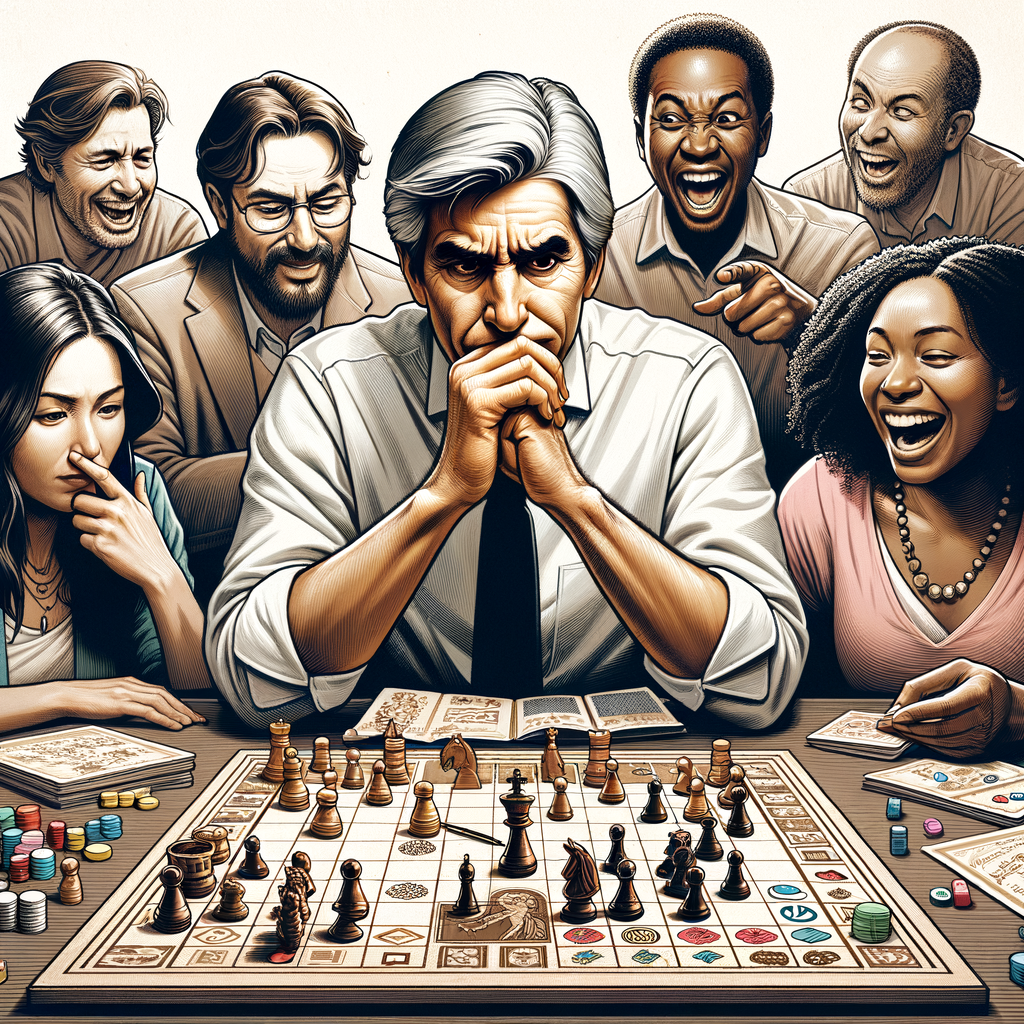Introduction to Board Gaming Psychology
Board games are not just about rolling dice, moving pieces, or drawing cards. They are a complex blend of strategy, decision-making, and most importantly, psychology. Understanding the psychology behind board games can greatly enhance your gaming experience and even give you an edge over your opponents. Let’s dive into the fascinating world of board gaming psychology.
- Understanding the importance of psychology in board games
Psychology plays a crucial role in board games. It influences how we make decisions, strategize, and interact with other players. For instance, a player’s ability to bluff, deceive, or predict an opponent’s moves in games like Poker or Chess is largely dependent on their understanding of human psychology. Studies have shown that board games can help improve cognitive functions such as problem-solving, memory, and critical thinking. Understanding the psychological aspects of board games can not only make you a better player but also enhance your enjoyment of the game.
- Overview of player dynamics in board games
Player dynamics refer to the interactions and relationships between players in a board game. These dynamics can greatly influence the outcome of the game. For example, in cooperative games like Pandemic, players must work together to achieve a common goal. On the other hand, in competitive games like Monopoly, players compete against each other to achieve individual success. Understanding these dynamics can help you adapt your strategy based on the game and the players you are playing with.
In conclusion, board gaming is not just about luck or strategy. It’s a psychological battlefield where understanding your opponents and your own mind can give you the upper hand. So the next time you sit down to play a board game, remember – it’s all in the mind!
Understanding Player Dynamics in Board Games
 Board games are not just about the roll of the dice or the draw of a card. They involve complex dynamics between players that can greatly influence the outcome of the game. Understanding these dynamics can enhance your gaming experience and even improve your chances of winning.
Board games are not just about the roll of the dice or the draw of a card. They involve complex dynamics between players that can greatly influence the outcome of the game. Understanding these dynamics can enhance your gaming experience and even improve your chances of winning.
Board Game Player Psychology
Let’s delve deeper into the psychological aspects of board gaming and how player interactions shape the game.
Exploring the psychological aspects of board gaming
Board games are a fascinating study of human psychology. They require strategic thinking, decision-making, and problem-solving skills. Moreover, they also involve a high degree of social interaction, which brings elements of persuasion, negotiation, and cooperation into play.
For example, in games like Monopoly, players often negotiate and form alliances to gain an advantage. This involves understanding the other players’ motivations and predicting their actions, which are key aspects of psychology.
Understanding player interaction in board games
Player interaction is a crucial part of board games. It’s not just about competing against each other, but also about working together, forming alliances, and sometimes even betraying each other to win.
Take the game Catan for example. Players must trade resources with each other to build their settlements. This requires negotiation skills and the ability to read other players’ intentions. It’s a perfect example of how player interaction can shape the course of a board game.
In conclusion, understanding the psychological aspects of board gaming and the dynamics of player interaction can greatly enhance your gaming experience. So the next time you play a board game, remember, it’s not just about the roll of the dice, but also about understanding your fellow players.
Board Game Strategies and Psychology
Board games are not just about luck or strategy. They also involve a significant amount of psychology. Understanding the psychology behind board games can help you develop better strategies and ultimately win more games. Let’s explore how strategy is influenced by psychology and some examples of psychological tactics in board games.
How strategy is influenced by psychology
Psychology plays a crucial role in shaping our strategies in board games. Our decisions are often influenced by our perceptions, emotions, and cognitive biases. For instance, a player might choose a less optimal strategy because they are overconfident or afraid of taking risks. This is known as the Dunning-Kruger effect and risk aversion respectively. Understanding these psychological factors can help players make better strategic decisions.
Examples of psychological tactics in board games
There are many psychological tactics that players use in board games. Here are a few examples:
- Bluffing: In games like Poker or Clue, players often bluff to mislead their opponents. This involves a deep understanding of human psychology and the ability to predict opponents’ reactions.
- Psychological Warfare: Some players use psychological warfare to intimidate or distract their opponents. This can involve trash talking, making unpredictable moves, or even using body language to convey false information.
- Pattern Recognition: Many board games involve pattern recognition. Players who are good at spotting patterns can predict their opponents’ moves and plan their strategies accordingly.
These are just a few examples of how psychology can be used in board games. By understanding these tactics, players can improve their game and have more fun playing.
In conclusion, psychology plays a significant role in board games. It influences our strategies and can be used to gain an advantage over opponents. So next time you play a board game, remember to consider the psychological aspects as well as the rules and strategies.
Social Dynamics in Board Gaming
Board games are not just about the roll of the dice or the draw of a card. They are also about the social dynamics that unfold around the gaming table. Let’s delve into this fascinating aspect of board gaming.
Player Interaction in Board Games
Player interaction is a key component of many board games. It can shape the game’s outcome and significantly enhance the overall gaming experience.
- Exploring the role of social dynamics in board gaming
Board games often require players to interact, negotiate, and form alliances. These interactions can create a rich tapestry of social dynamics, where players must navigate through the complexities of human behavior to achieve their goals. For example, in games like “Monopoly” or “Settlers of Catan”, players often need to negotiate trades with others, requiring both strategic thinking and social skills.
- Case study: The impact of player interaction on game outcomes
Let’s consider the popular board game “Diplomacy”. In this game, players represent European powers at the dawn of the 20th century, and they must form and break alliances to gain control over Europe. A study conducted on this game showed that players who were better at forming alliances and managing relationships with other players were more likely to win. This demonstrates the significant impact of social dynamics on game outcomes. (source)
In conclusion, the social dynamics in board games can greatly influence the game’s outcome and the players’ enjoyment. So, the next time you play a board game, remember – it’s not just about the game pieces. It’s also about the people you’re playing with.
Psychological Tactics in Board Games
Board games are more than just a source of entertainment. They are a battleground for the mind, where players employ various psychological tactics to gain an upper hand. Let’s delve into understanding these tactics and how to use them effectively.
Understanding the use of psychological tactics in board games
Psychological tactics in board games can be as simple as bluffing about your next move, or as complex as manipulating the game’s social dynamics to your advantage. These tactics often involve understanding your opponents’ thought processes, predicting their moves, and using this information to plan your strategy.
For example, in the game of chess, a player might make a seemingly weak move to bait their opponent into a trap. This is a psychological tactic known as a ‘decoy’. In poker, players often bluff about their hand to mislead their opponents, a tactic that requires understanding of human behavior and deception.
Another common psychological tactic is ‘psyching out’ your opponent. This involves creating a mental distraction that throws off your opponent’s concentration, causing them to make mistakes. This can be done through subtle comments, body language, or even strategic game moves.
Key takeaways: How to effectively use psychological tactics
Using psychological tactics effectively in board games requires practice and a deep understanding of the game and your opponents. Here are some key takeaways:
- Know your game: Understanding the rules, strategies, and dynamics of the game is the first step towards using psychological tactics effectively. The more you know about the game, the better you can manipulate its elements to your advantage.
- Understand your opponents: Every player has a unique style and strategy. By observing your opponents and understanding their strategies, you can predict their moves and plan your tactics accordingly.
- Practice deception: Deception is a key element in many psychological tactics. Practice bluffing and misleading your opponents to gain an advantage. But remember, the best deception is the one that’s least expected.
- Stay calm and focused: Psychological tactics can only work if you stay calm and focused. If you let your emotions get the best of you, your tactics may backfire.
In conclusion, psychological tactics can add a whole new layer of strategy and excitement to board games. So, the next time you play, try incorporating some of these tactics and see how they can change the game!
Conclusion: The Impact of Psychology on Board Gaming
In this blog post, we’ve delved into the fascinating world of board gaming and its intricate relationship with psychology. We’ve explored how player dynamics, social interactions, and strategic thinking are all influenced by psychological principles. Now, let’s recap and share some final thoughts on this intriguing topic.
- Recap of the influence of psychology on player dynamics and strategies:
Psychology plays a significant role in shaping player dynamics and strategies in board games. Understanding the motivations, emotions, and cognitive processes of players can help us predict their actions and reactions during the game. For instance, a player’s competitive spirit might be driven by their need for achievement, a concept rooted in psychology. Similarly, the strategies players adopt can be influenced by their cognitive biases, such as the tendency to overvalue their own pieces or underestimate their opponents.
- Final thoughts on the psychological aspects of board gaming:
Board games are much more than just a source of entertainment. They are a reflection of our psychological processes and social interactions. They can teach us about human behavior, decision-making, and emotion management. They can also foster social connections and enhance cognitive skills. As we continue to explore the psychological aspects of board gaming, we might discover even more benefits and insights into human nature.
In conclusion, the impact of psychology on board gaming is profound and multifaceted. It shapes the way we play, interact, and strategize, making each game a unique psychological journey. So, the next time you sit down for a board game, remember – you’re not just playing a game, you’re engaging in a fascinating psychological experience.



